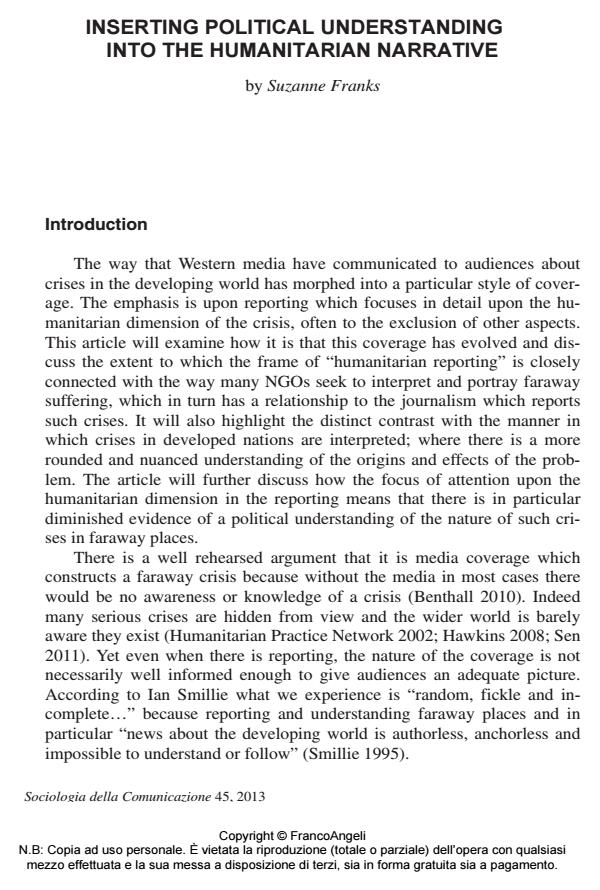Inserting political understanding into the humanitarian narrative
Journal title SOCIOLOGIA DELLA COMUNICAZIONE
Author/s Suzanne Franks
Publishing Year 2014 Issue 2013/45
Language Italian Pages 15 P. 22-36 File size 136 KB
DOI 10.3280/SC2013-045003
DOI is like a bar code for intellectual property: to have more infomation
click here
Below, you can see the article first page
If you want to buy this article in PDF format, you can do it, following the instructions to buy download credits

FrancoAngeli is member of Publishers International Linking Association, Inc (PILA), a not-for-profit association which run the CrossRef service enabling links to and from online scholarly content.
Western media reporting of disasters in faraway countries (especially in Africa) frequently follows a template which fails to take account of political circumstances. Very often journalism relies upon familiar stereotypes - using frames such as "primitive tribal hatreds" or resorting to explanations based upon "natural disaster", when there are in fact complex underlying social and political causes to many crises and complex emergencies. This paper will analyse the way that so called "humanitarian reporting" has failed to take account of political explanations with reference to key case studies and explain why this is a matter of vital concern. It will highlight the powerful and consciously apolitical position of international aid agencies and examine the many layered and interrelated factors which contribute to the absence of political analysis in the way that distant crises are described and understood.
I reportage dei media occidentali relativi a catastrofi che colpiscono Paesi lontani (soprattutto in Africa) molte volte seguono uno schema che non prende in considerazione le circostanze politiche. Molto spesso il giornalismo si basa su stereotipi familiari - utilizzando frames come gli "odi tribali primitivi" oppure ricorrendo a spiegazioni basate su "catastrofi naturali" - quando alla base di molte crisi ci sono in realtà cause politiche e sociali complesse, così come complesse sono le stesse emergenze. Il saggio analizzerà il modo in cui il cosiddetto "reportage umanitario" ha omesso di prendere in considerazione le spiegazioni politiche con riferimento a casi studio chiave e spiegherà perché si tratta di una questione di interesse vitale. Si metterà in evidenza la posizione di potere e consapevolmente apolitica delle agenzie umanitarie internazionali e si esamineranno i diversi fattori stratificati e interconnessi che contribuiscono all’assenza di analisi politica nelle modalità in cui le crisi lontane sono descritte e interpretate.
Keywords: Humanitarian, politics, disaster, reporting, crisis, narratives.
Suzanne Franks, Inserting political understanding into the humanitarian narrative in "SOCIOLOGIA DELLA COMUNICAZIONE " 45/2013, pp 22-36, DOI: 10.3280/SC2013-045003